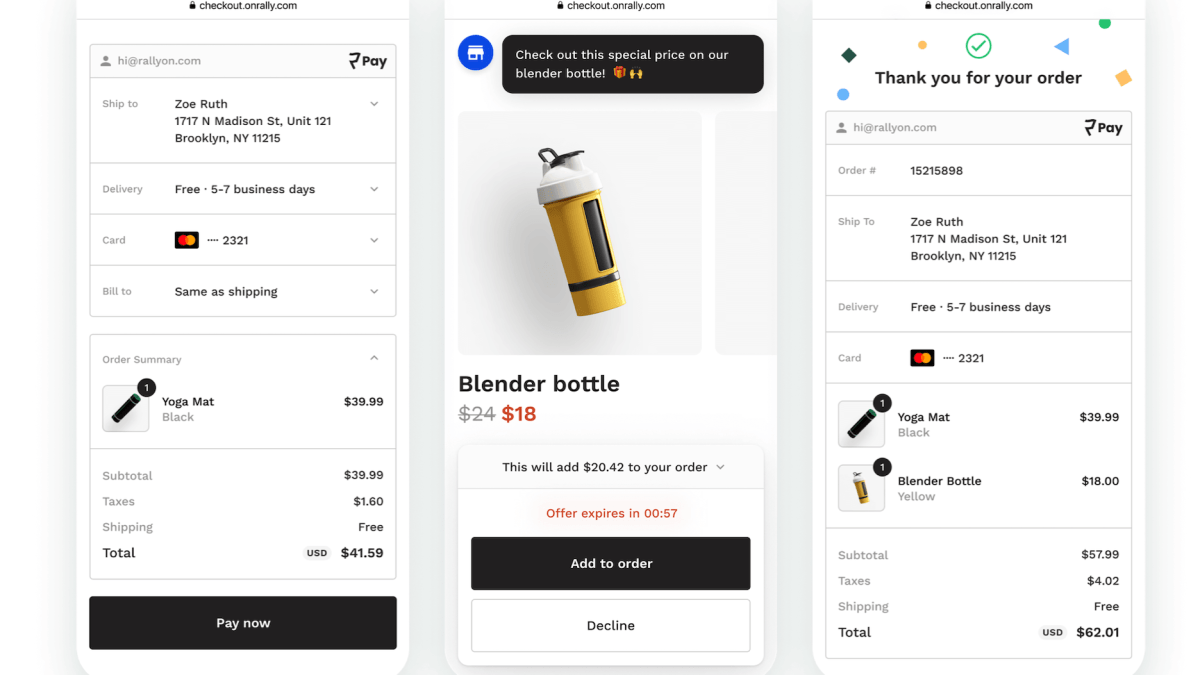E-commerce had a moment during the global pandemic, but not only have things chilled since then, it’s gotten downright competitive as the economy cooled in the past year, according to Jordan Gal, co-founder and CEO of Rally.
“Founders in this space used to speak of optimism, but that has turned into realism, and people are more careful,” Gal told TechCrunch. “The pie seems to have stopped growing, and there’s more ferocious competition for what’s left in that pie.”
Gal went on to explain that merchants are having to make harder decisions, including whether they can afford to invest in software.
That’s why Rally, a composable checkout platform for e-commerce merchants, has broken up its business into two segments: the first to meet merchants where they are with integrations to commerce tools, like Salesforce Commerce Cloud, Magento and BigCommerce; the second to offer merchants a “headless” ecosystem.
The term “headless” refers to the ability to change the front end or back end of a website without affecting the other. Gal said he was not able to provide details just yet, but said Rally is close to announcing a partnership with companies specializing in front end and back end to offer headless-as-a-service.
Gal started Rally with Rok Knez to create checkout tools for merchants outside of the Shopify ecosystem. Both were previously involved with another checkout company, CartHook, and led the company to process nearly $3 billion in transactions for Shopify merchants before selling to Pantastic in 2021, Gal said.
Rally, which is working with 50 e-commerce merchants currently, provides one-click checkout with payment processing and tools for post-purchase offers that turns the purchase into a multi-revenue channel by allowing the merchant to inject offers after the checkout. For example, rather than going right to a “thank you” page, consumers would be offered the option of upgrading to a subscription or purchasing additional similar products in a way that doesn’t interrupt the payment flow.
Implementing the post-purchase offer has helped merchants increase revenue by over 12% on average, Gal said.
Meanwhile, over the past 12 months, Rally has doubled the size of its team and is “doing millions in monthly GMV (gross merchandise volume),” Gal said.
TechCrunch previously profiled the company when it raised $6 million in seed funding. Today, the company announced additional funding of $12 million in Series A funding. It was led by March Capital, which was joined by Felix Capital, Commerce Ventures, Afore Capital, Alumni Ventures and Kraken Ventures. The new investment, which closed in the first quarter of 2023, gives Rally $18 million in total venture-backed capital.
Gal plans to focus the new funding on go-to-market, including entering new markets, like enterprise and international, and expanding integrations beyond Swell, BigCommerce and others, including Salesforce Commerce Cloud, commercetools, Affirm and AfterPay. Rally will also focus on strengthening its fraud protection offering and build out web3 features, starting with allowing merchants to accept cryptocurrencies in their checkout.
“We want to establish a reputation as the best choice when a merchant is looking to either upgrade their checkout or build a new site without having to build their own checkout,” Gal said. “You can’t just build it and leave it alone, so merchants are looking for a partner that they can trust so they can focus on what they’re best at.”
If you have a juicy tip or lead about happenings in the venture world, you can reach Christine Hall at chall.techcrunch@gmail.com or Signal at 832-862-1051. Anonymity requests will be respected.
